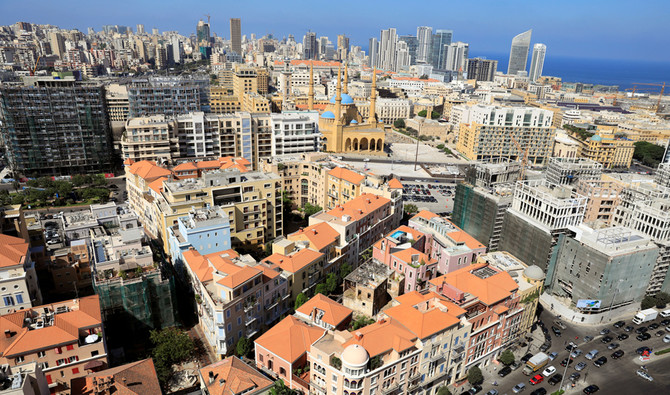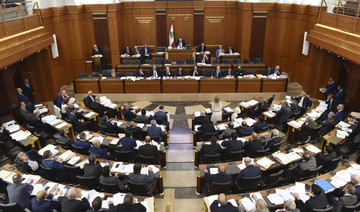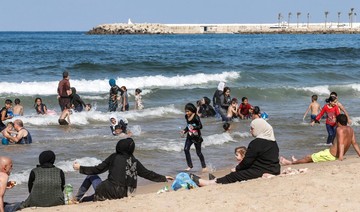BEIRUT: Lebanese General Security has arrested a Palestinian refugee suspected of being a Daesh member who was assigned to poison the water supply of army barracks.
The man was also planning to execute a mass poisoning operation in a foreign country, the agency said.
In a press statement released on Thursday, the Lebanese General Security said: “As part of tracking down terrorist sleeper cells in Lebanon and their members, and based on an indication by the specialized public prosecution, the Lebanese security forces arrested the Palestinian refugee M.H.A (born 1991) for the charge of being a member of the terrorist organization Daesh and communicating with terrorists inside Syria.”
The statement added: “After interrogating the suspect, he pleaded guilty to the charges he faced and admitted his association to a Daesh member in Syria known as Abu Jallad, who assigned to him the preparation explosives and toxic substances.”
Two operations
It said: “At the request of Abu Jallad, the suspect had prepared an amount of lethal poison in collaboration with another person, who lives in a foreign country and visits Lebanon frequently, in order to carry out two operations inside and outside Lebanon.”
The Lebanese General Security said that the first operation included poisoning a water tank that supplies one of the Lebanese army’s tanks before it was transferred to the barracks, to kill the largest number of military officers and soldiers.
The second operation included “the implementation of a mass poisoning operation in a foreign country, where food was to be poisoned at a public party (a birthday party for example).”
General Security said that the suspect was referred to the competent jurisdiction after the interrogations were concluded and measures are being taken to arrest other suspects.
General Security Chief Maj. Gen. Abbas Ibrahim met on Thursday with French Ambassador to Lebanon Bruno Foucher, but a security source told Arab News that France was not the country targeted by the suspect.
Meanwhile, clashes took place at the Lebanese-Syrian border between professional human traffickers and Lebanese armed forces, killing a Syrian woman and injuring four other Syrians.
A military source told Arab News that a group of professional smugglers tried to smuggle 200 Syrians from Syrian territory toward Lebanese territory on the outskirts of the town of Sawiri, and when they were within the army’s readiness area, fired at Lebanese soldiers but hit a Syrian woman who had crossed into the Lebanese army’s readiness area.
Sawiri is Lebanon’s most important land gate as the official Masnaa border crossing is located there. Smugglers try to cross through the outskirts of the town to enter Lebanese territory as it is close to Syrian residential communities on the other side of the border.
The professional smuggling of Syrian citizens into Lebanon through the rugged mountains between Lebanon and Syria has been significantly increasing, and on Thursday things became violent and included an exchange of fire.
People being smuggled into Lebanon need to walk for six to seven hours to cross the border, while choosing another location requires double this time, according to a military source.
The Lebanese Army Directorate of Orientation said in a statement: “On Thursday at four in the early morning, the Lebanese armed forces traced on the outskirts of Sawiri in Bekaa around 200 Syrian people trying to sneak into Lebanese territory. A group of smugglers started firing at the Lebanese soldiers and the smuggled people, killing a woman and injuring four other Syrians, who were taken to a hospital in Sawiri. The Lebanese army fired back at the smugglers and arrested a large number of them.”
The Directory of Orientation stressed that “Lebanese armed forces will continue to track down the smugglers who fired at the Lebanese soldiers, and the arrested smugglers will be handed over to the competent authority to take necessary measures.”
The military source said that the number of Syrians sneaking into Lebanon increases at the end of each month as they enter Lebanon to receive aid from the UNHCR and they return to Syria through official border crossings.
“They come to Lebanon, register themselves as refugees, then return to Syria,” he said.
However, a UNHCR source said that smuggling people into Lebanon was not a new trend, but the UN agency had not yet investigated the matter to find out the reasons behind it.
“We have a general idea that some Syrians are sneaking into Lebanon because they are facing problems with the Syrian government, preventing them from entering Lebanon through official border crossings,” the UNHCR source continued.
“Sneaking into Lebanon has increased during the war because people are no longer capable of reaching the official crossings because of the many checkpoints on their way, so they resorted to sneaking through the empty lands between Lebanon and Syria.”
























